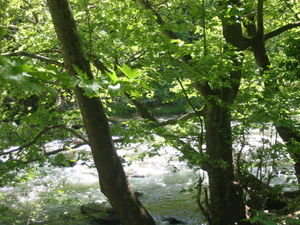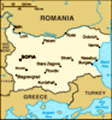Advertisement

 Chaya river
Chaya river
Chaya riverBulgaria Trip
Plovdiv and Bachkovo Monastery
I wanted to visit Rila Monastery but Evan told us that as the President of the country was visiting the monastery on the same day, foreigners would not be allowed to visit due to security reasons.
I was not exactly heart-broken. After all, when I visited Plovdiv, I would also be visiting the second largest monastery, the Bachkovo Monastery.
However, my plans appeared to be jinxed because the car had been booked by another lady from the Sheraton hotel.
“You can go on the tour if you are willing to share the car with another lady”. The tour-desk-manager of Sheraton said.
I was more than willing. It would be nice to have the company of another lady on the long drive.
Accordingly, I was waiting in our hotel lobby when the guide phoned the counter and told that they would be a bit late because they were held up in the traffic. They had gone to pick up the lady from Sheraton Hotel.
When the car came to pick me up, I did not find the lady in it.
“Where is the other lady?” I asked

 Roman Theater
Roman Theater
The Antique Theaterin surprise.
“She cancelled her booking at the last moment” said the guide. He was rightly peeved with the lady.
So, I went to Plovdiv and Bachkovo Monastery alone with the driver and the guide.
They were nice, old men, but the guide’s English was rather poor. The driver’s English was better. Whenever I asked a question, the guide repeated the question to the driver, who usually gave the correct answer.
I got reconciled to the idea that there won’t be much ‘guidance’ on the tour. That was OK by me. After all, the information about Plovdiv and Bachkovo Monastery was available on the Internet. So, I gave up the Quest for Knowledge and just relaxed and enjoyed the drive.
The beautiful, green grassy pastures were further adorned with wildflowers like the red poppies and some yellow flowers in such profusion that they looked not only like green carpets, but green carpets with lovely flowery designs.
And what a beautiful drive it was as the car ascended the serpentine contours of the Rhodopy Mountains! The road winds through a forest of tall, dark evergreens while the itsy bitsy Chaya river gurgles down by its

 The Roman Stadium
The Roman Stadium
Partly excavated Stadiumside.
It was certainly a soporific scene.
I was enjoying the silence of the forest and feeling a bit drowsy when suddenly the Guide said that Spartacus was born here in these Rhodopy Mountains.
“Kirk Douglas? He was a Bulgarian? I thought he was an American actor.” This was my first reaction. Then the mists cleared and I remembered that Spartacus was a gladiator and a slave who led a rebellion against the Roman masters. (Here my mind again prompted, “But Russell Crowe was the Gladiator, wasn’t he?” Oh, *&&^%%$ Hollywood! It really makes it difficult to differentiate the historical characters and the actors who played the roles. )
I shook myself awake to enjoy the scenery.
Bachkovo Monastery is small but its setting and the deer-horns and turtle-shell nailed to its beam at the door strongly reminded me of the Hadimba Devi Temple in Kulu-Manali. I have never seen a Temple which looks so mysterious.
I suppose forest temples are bound to have offerings of this sort by the devotees, who are basically hunters.
From Bachkovo Monastery we proceeded to Plovdiv.
I think they should call it Plovdivs (Plural) because the modern part of Plovdiv as very different from the cobble-stone-paved, wooden-housed old part.
As soon as I stepped into the Main Street, I thought I was in Ramoji Film city because it looks so unreal. The pastel-colored buildings look as though they are made out of Plaster of Paris and the tourists milling about look as though they are playing a part.
As against that, the old part of the town looks very real and reminds you that it is real by causing a pain in the knees and calves of the legs while you walk. Cobble-stoned streets are not exactly kind to the joints. The wooden houses look exotic but decidedly lack in decent plumbing, euphemistically called the ‘modern amenities’.
(I like to guess the origin of words and it is my guess that ‘cobbler’ is a person who mends shoes damaged by the cobble-stones.)
Plovdiv would never have been on the tourist map but for its Roman ruins. The TWO ruins, which have been partly excavated, are the Antique Theater and the Roman Stadium.
We have seen many Roman ruins. Practically everywhere, the Romans, being practical people, combined the jobs of a Theater and a Sports arena in a single building.
After all, when the afternoon ‘matinee’ show of gladiatorial combat was over, the corpses were thrown in the cages of lions and tigers and the blood had been washed away; the same structure could be used to stage dramas/singing etc. in the evenings.
The selfsame ‘pit’ audience that had pelted the gladiators and lions alike with peanut-shells; could now replenish its stock and add rotten tomatoes to it; to bombard the tragediennes with.
(Oops, I forgot, both peanuts and tomatoes came from the New World, and did not exist in the old world at that time.)
What was so special about Plovdiv that Romans built TWO different structures, the Theater and the Stadium?
(This is strictly a rhetorical question. I do not expect you to know the answer.)
This extravagance in the matter of two structures suggests that Plovdiv was a Metropolis at that time and needed more than one ‘Entertainment houses’. (I am using this phrase because Gladiatorial combat could be thought of both as ‘Entertainment’ or ‘Sport’.
Those Romans were great. They also built Roman Baths everywhere to wash away the stress and strain of watching so many ‘shows’.
Having admired the Romans, we came back to Sofia.
Advertisement
Tot: 0.345s; Tpl: 0.011s; cc: 13; qc: 59; dbt: 0.0988s; 1; m:domysql w:travelblog (10.17.0.13); sld: 1;
; mem: 1.2mb








Milen Penchev
non-member comment
Nice Blogs
Your blogs are very entertaining. One correction if I may. The amphitheater was built in the Ancient Greek time, long before the Romans came. Plovdiv or Puldin as the Slavs called it was founded by the father of Alexander the Great, Phillip the Second, hence the original name of the city - Phillipopolis. I hope you don't mind the little history lesson. Will be glad to read more from you. I like how you compare everything with Indian experiences from back home.